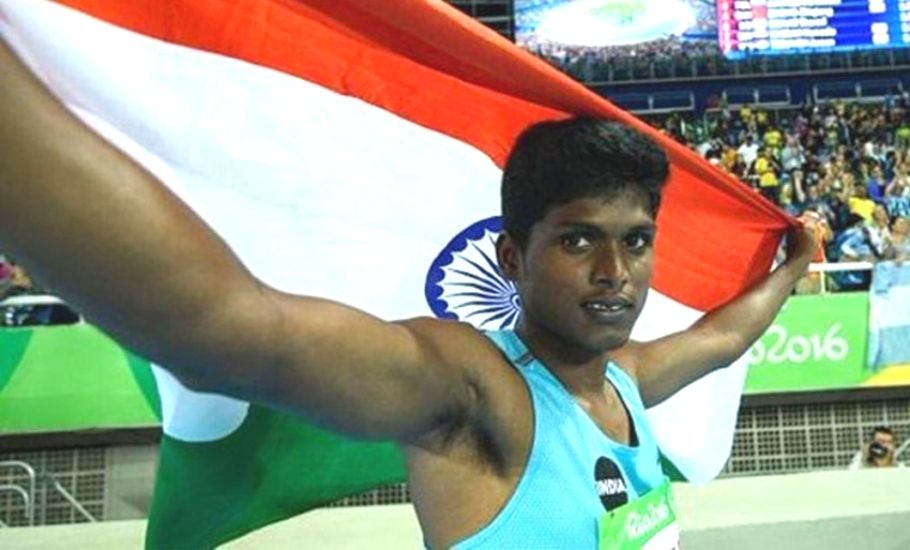
When Mariyappan Thangavelu used to work as newspaper hawker
From being a newspaper hawker to a Khel Ratna, it has been quite a ride for Paralympic gold-medallist Mariyappan Thangavelu, who still gets goosebumps thinking about the life he endured before sport changed it in more ways than one.

From being a newspaper hawker to a Khel Ratna, it has been quite a ride for Paralympic gold-medallist Mariyappan Thangavelu, who still gets goosebumps thinking about the life he endured before sport changed it in more ways than one.
The 25-year-old, who won a men’s high jump gold in the Rio Paralympics, is among the five athletes picked for the country’s highest sporting honour this year. He will be bestowed the award in an unprecedented virtual ceremony on August 29 due to the COVID-19 pandemic.
Thangavelu still cannot believe how far he has come after suffering permanent disability at the age of five when a bus crushed his right leg below the knee.
“For three years from 2012 to 2015, I did whatever I could to support my mother to run the family. I was a newspaper hawker in the morning and daily wage labourer at construction sites in day time,” he told PTI in an interview.
“Time flies, I thought it was just yesterday. I get goosebumps remembering those days. I never thought I would reach this far,” said Thangavelu who hails from Salem district in Tamil Nadu.
Thangavelu, who also won a bronze in the 2018 Asian Para Games in Jakarta, is currently training at the Sports Authority of India’s Bengaluru centre to prepare for Tokyo Paralympics next year.
His younger brother is currently studying law in Salem while his sister got married. His father reportedly abandoned the family when Thangavelu was young, leaving his mother as the only bread earner before he chipped in.
Related news: Unprecedented 8 para-sports personalities to get Khel Ratna, Arjuna award
Elaborating further on his ordeal before becoming a star, Thangavelu said, “These three years, I would walk 2 to 3km every morning from my house to deliver newspapers to other houses. After that, I will go to construction sites.
“In total, I used to get ₹200 per day. I had to do that to support my mother who also works as a daily wage labourer as well as a vegetable-seller.”
This was before he was to be taken to Bengaluru by his current coach R Satyanarayana, who saw Thangavelu’s potential as a future medal-winning para-athlete. Thangavelu was introduced to sports during his school days.
In 2013, Satyanarayana first noticed Thangavelu’s talent during the National Para-athletics Championships. Thangavelu was 18 then. In 2015, Thangavelu was brought to Bengaluru and the rest, as they say, is history.
After the 2016 Paralympics, Thangavelu bought a piece of land from the money he got from various sources as incentives. In 2018, he was also made a coach by the SAI, giving him a Group A post.
“My family is much better now financially. I am now a SAI coach and I am under TOP Scheme also. I am not facing any issue as far as my training is concerned,” he said.
Related news: Paralympic Committee puts national, state events on hold due to COVID-19
Thangavelu qualified for the Tokyo Paralympics after finishing third in the T-42 high jump event at the IPC World Athletics Championships in Dubai last year.
His target is to win another gold and create a world record in his event in Tokyo Paralympics (August 24 to September 5, 2021) by clearing the 2-metre mark. That will not be easy as he will have to improve by 11 cm from his current personal best of 1.89 m.
A gold in Tokyo will put him at par with javelin thrower Devendra Jhajharia who won the yellow metal in 2004 and 2016 Paralympics.
“I train twice a day, 7-9 in morning and 4-6 in evening. A world record in Tokyo is my target and I think I can achieve it. My coach said I will have to increase my running speed before take-off. So, I am having 50 m sprint races these days,” he said.
The current world record in T-42 high jump stands at 1.96m.

